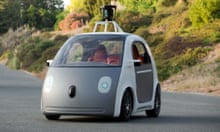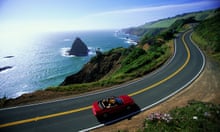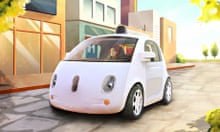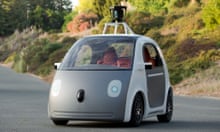Why did Google have to make its prototype driverless vehicle look like a child's toy car? What does it mean? Are we to be children guided by Google-knows-best?
This is not to criticise the concept. I am very much in favour of self-driving vehicles. My mother died in a car accident, and the engineering case for bringing more automation into transportation is sound. Nor is it to criticise the motivations of the people at Google, who are well meaning and are friends of mine.
But the notion that a company that makes its money almost exclusively by collating personal information for the express purpose of manipulating human behaviour (that's you, Google) would also be in charge of moving people around is dangerous: deliriously absurd, a sign of civilisational dementia. Can you imagine if your car lingered in front of billboards during your journey or forced you to a particular store on the way home? What if automatic delivery trucks preferred one vendor to another? It is possible to imagine Google attempting to kill Amazon that way, or vice versa.
Obviously, information is power. That means information is wealth. If we must accept yet more extreme information concentration in order to benefit from the increased safety and convenience of better transportation, then it isn't worth it. This idea that a marked loss of democracy is worth the safety or convenience has always been dangled before us, and has always been wrong.
Yes, we need more automation when big machines are moving around in our midst, so that they don't crush us. It's a necessary thing to do, and Google is certainly not the only company working on it. But that does not have to mean increasing the scope of the surveillance economy.
That is why the software and governance of vehicle automation must remain distributed. It can be commercial as long as every individual can benefit economically. Google would have to ask you, and certainly pay you, after every trip to be able to make any use at all of the data that emerges.
New kinds of automation can also be open and public, as long as there are extremely strict safeguards to prevent players with giant computers from gaming the system through their high powers of analysis. That would require hyper-adept, well-monitored and empowered regulators. So far, it has been hard for regulators to keep up, to say the least.
From a technical point of view, the main point is that there is no need to accept a trade-off that gives us safer vehicles only in return for increased central control. I am sick to death of being told that either you're pro-technology, and must accept the whole package, or you're a Luddite – a backward, primitive troll. We can make more precise demands, and we have to.
I've seen how the technological sausage is made. I've helped make much of it. It's thrown together; it's sloppy; it's often rather arbitrary. Technologists are often blinded by the blazing magnitude of our own self-interest. There are actually a multitude of ways to conceive of car automation. In the old movie Minority Report, which I helped to brainstorm, the automated cars attach right to one's apartment and open into it but then yield to human control when out in the countryside. Much of that design was conceived by MIT's Neil Gershenfeld, if I remember correctly.
At the pre-brainstorming brainstorming sessions for the movie, at the Global Business Network, people brought all sorts of interesting ideas to the table.
So, please, we must insist that society becomes safer. But that doesn't mean we have to become a nursery, as if we were all children, herded this way and that by faraway, hyper-wealthy technocrat nannies.







